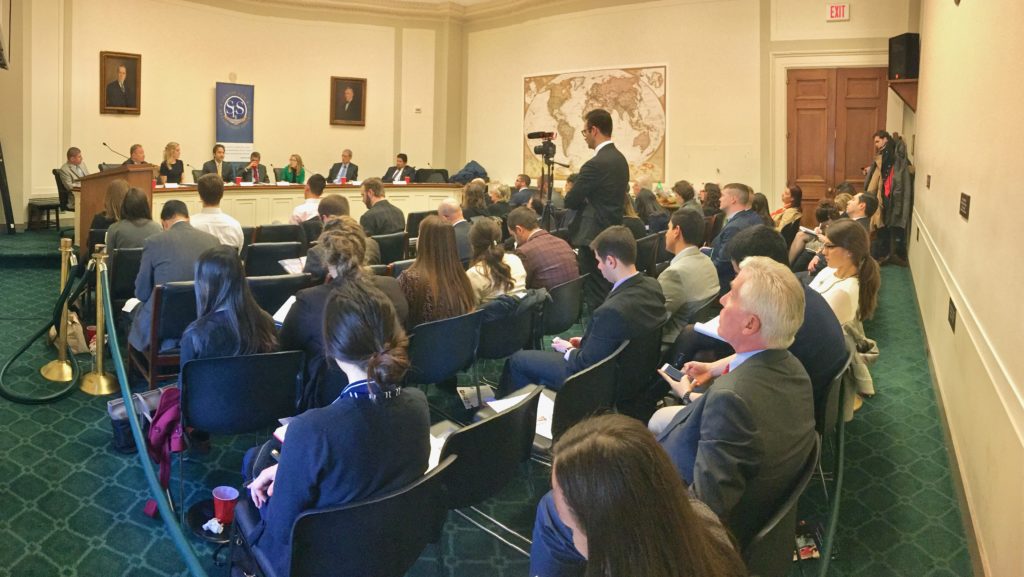Hidden Dragon: China’s Stealthy Rise in Latin America
On Tuesday, February 27th, the Center for a Secure Free Society (SFS) hosted an expert panel to discuss Chinese activity in Latin America, titled Hidden Dragon: China’s Stealthy Rise in Latin America. The event coincided with the release of our latest Global Dispatch, “The Dragon and the Condor: Beyond China’s Economic Activity in Latin America.” Guests gathered in the House Foreign Affairs Committee Hearing Room in the Rayburn House Office Building for an early lunch and an all-star panel.

The panel featured SFS Senior Fellow Fernando Menéndez, Author Gordon G. Chang, the Inter-American Dialogue’s Margaret Myers, and Deputy Executive Director of the Prague Security Studies Institute Andrew Davenport, and was moderated by Associate Editor at The Daily Caller, Julia Nista.

To start, Florida Congressman Ted Yoho took the stage to discuss the importance of SFS’s message and the urgency of meeting Chinese imperialists’ efforts with decisive action. JD Gordon then came to the podium to introduce the panelists and moderator before handing the reins over to Julia Nista to begin moderating the discussion.
Following the panelists’ opening statements, Nista began by asking the panel as to the capacity that China has expanded its presence in Latin America and what that expansion means for American interests in the region. Menéndez explained that, while on the surface, the Chinese appear to only be entering the region economically, it would be a grave mistake to look at China’s growing presence in Latin America as purely an economic phenomenon. Chang contributed to this sentiment by positing that experts base their expectations of China’s plans in Latin America on what the country has done in Africa, where China has established a significant presence on what Chang considers its “second continent.”
Nista transitioned the panel by stating that China is by no means just a financial threat and that its investments in infrastructure, optics, and cyber all pose significant sharp power problems and opened it up to the panel to discuss what this could mean for United States interests. Menéndez led by saying that a cable to Chile will allow Chinese state-run telecommunications giant Huawei to control the cyber access in that region and how China has had a less-than-stellar record with enabling connectivity to an open-access internet. Myers added her concern that China has appropriated more than 150 billion dollars in financing to Latin America, and also speculated as to the possibility that these investments in the Belt and Road Initiative could backfire in a big way. This concern was further addressed by Davenport when he added that China is having problems with how liberally they are granting their loans. He noted that Venezuela, one of the three major Latin American countries to get involved with Chinese development, is starting to look a lot like Tanzania, where the return on investment made by China has been nonexistent following severe economic turmoil.
A later topic of discussion was centered on whether or not China has the follow-through necessary to complete the Belt and Road Initiative and if it will in the future. Chang explained that China is increasing its GDP every year by 10%, which means that after 7 years that the economy doubles and this demonstrates the country’s capability to carry out the elaborate project. Davenport responded that the Silk Road had been overly romanticized and that China sees the Belt and Road Initiative as a way to market itself internationally. Myers explained that for every deal that becomes operational within the Belt and Road Initiative, that there are two or three more plans that have made the list that will never enter production. Menéndez elaborated further, saying that China will gain more and more soft power as more countries show themselves willing to work with Beijing.
These are just a couple of the points reviewed in the February 2018 issue of the Global Dispatch, titled: The Dragon and the Condor: Beyond China’s Economic Influence in the Americas. A link to the full publication may be found here.


